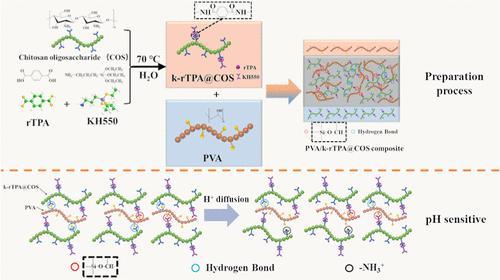当前位置:
X-MOL 学术
›
ACS Sustain. Chem. Eng.
›
论文详情
Our official English website, www.x-mol.net, welcomes your feedback! (Note: you will need to create a separate account there.)
Chitosan Oligosaccharide Modified with the Waste Polyethylene Terephthalate Depolymerization Monomer Enhances the Water-Induced Shape Memory Performance of PVA
ACS Sustainable Chemistry & Engineering ( IF 7.1 ) Pub Date : 2024-06-18 , DOI: 10.1021/acssuschemeng.4c01054 Yue Shen 1 , Hui He 1 , Hongyu Zhai 1 , Qunyang Li 1 , Cheng Zhang 1 , Fan Kang 1 , Yujia Liu 1
ACS Sustainable Chemistry & Engineering ( IF 7.1 ) Pub Date : 2024-06-18 , DOI: 10.1021/acssuschemeng.4c01054 Yue Shen 1 , Hui He 1 , Hongyu Zhai 1 , Qunyang Li 1 , Cheng Zhang 1 , Fan Kang 1 , Yujia Liu 1
Affiliation

|
Depolymerization of waste poly(ethylene terephthalate) (PET) into monomers, followed by their processing and utilization, presents an efficient strategy for PET recycling. Water-induced shape memory materials have attracted considerable interest for their environmental sustainability, safety, and cost-effectiveness. While the shape memory performance of poly(vinyl alcohol) (PVA) is moderate, it can be enhanced by introducing hydrogen bonds or a more stable network structure. Therefore, this study focuses on modifying depolymerized monomer rTPA with silane coupling agent KH550 for the preparation of PVA composite materials, specifically targeting the modification of chitosan oligosaccharides (COS). The hybrid material k-rTPA@COS is synthesized by blending depolymerized monomer rTPA, silane coupling agent KH550, and chitosan oligosaccharide COS in an aqueous solution. This is followed by its reaction with the PVA matrix to create the PVA/k-rTPA@COS composite material after drying. In terms of mechanical properties, the composite material’s maximum elongation at break reaches 262.1%, a 54.3% increase compared to pure PVA (169.9%). Additionally, the inclusion of k-rTPA@COS significantly enhances the shape memory performance of the composite, achieving a 100% recovery rate in just 7 min. The performance is further improved under acidic conditions, with complete recovery to the original shape in as little as 3.5 min.
更新日期:2024-06-18











































 京公网安备 11010802027423号
京公网安备 11010802027423号